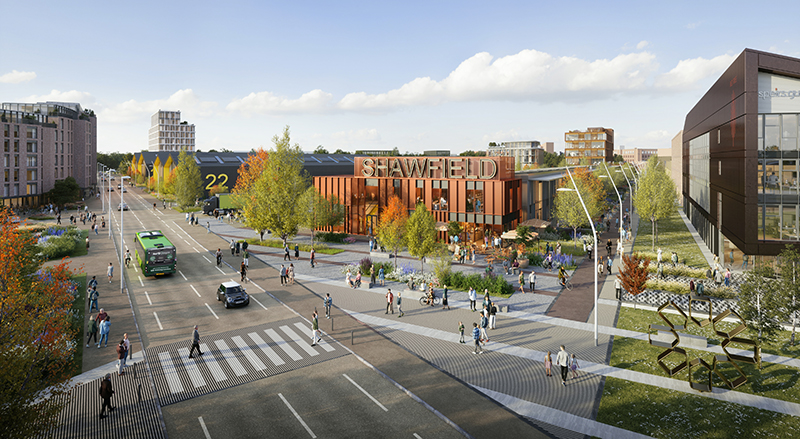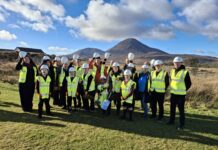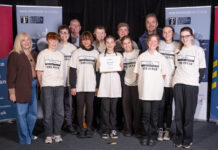
AS Glasgow looks forward to hosting the 2026 Commonwealth Games next summer, the continuing regeneration of Bridgeton, Dalmarnock and Rutherglen has been celebrated as part of the legacy of the previous games, hosted in 2014.
Regeneration specialist Clyde Gateway, which was set up to deliver a legacy for the communities surrounding the main venues such as the Sir Chris Hoy Velodrome and the Emirates Arena, has secured over £1.5 billion of private and public sector investment since its inception.
More than 4,000 new homes and over 8,300 jobs have been created, with the support of partners Scottish Enterprise, Glasgow City Council, and South Lanarkshire Council.
Recently, Scotland’s first minister John Swinney hailed the project as ‘a shining example of what can be achieved’ when visiting a newly completed project in Shawfield.
Parts of the Clyde Gateway area faced decades of economic decline following deindustrialisation. Huge swathes of the east end of Glasgow and Rutherglen had been unable to be redeveloped due to contaminated land from heavy industries of the past. However, Clyde Gateway has spearheaded the remediation of over 700 acres of land, bringing it back into productive use.
The organisation has also created 160,000 sqm of business floor space and three new greenspaces including Cuningar Loop, Riverside Park, and Malls Mire Woodland Park.
They recently announced a £500 million masterplan to continue regeneration work, including the redevelopment of Shawfield Stadium, will also see a new park created adjacent to Dalmarnock station.
Martin Joyce, executive director of regeneration, Clyde Gateway, said, “Communities in Clyde Gateway have seen a huge transformation since we began the regeneration, building thousands of new homes and bringing over 8,000 jobs to an area that was facing difficult economic challenges. What once was derelict land, contaminated by heavy industry like chemicals and gas works, has been transformed into productive use, with beautiful greenspaces for people, new premises which have attracted micro-businesses to multinationals, and over 4,000 quality private and social homes.
“Boxing Scotland, the national governing body for amateur boxing, is also proudly based in Bridgeton, further highlighting the area’s role as a hub for sport and community development.
“With the Commonwealth Games on the horizon once again it is an opportunity to reflect on the legacy of the last games, but also a reminder that there is still much more to do. That is why we recently announced a new £500m masterplan that will remediate and transform a further 250 acres of land into a mixed-use ecosystem of homes, hotels, business and commercial space, all powered by low carbon heat networks and green infrastructure. This will help bolster the futures of local people, creating jobs, transforming lives, and securing a positive legacy for local communities.”
Phil Batty, CEO of the Glasgow 2026 Commonwealth Games, added, “We cannot wait to welcome the nations of the Commonwealth back to Glasgow next year. All efforts are focused on delivering an altogether brilliant Games with the largest medal programme in Games history. A Games that truly reflects the spirit of Glasgow and everyone who lives here. Ten thrilling sports, four iconic venues and around 3,000 athletes immersed in a city renowned for its warmth, humour and energy.
“Glasgow can be truly proud of its pivotal role in hosting a Games that marks a new era for Commonwealth Sport. This is legacy in action. We are building on the amazing venues and talent delivered during Glasgow 2014 and pioneering a new model for future host nations. Everything we have come to expect from a city as generous as Glasgow.
“Last week we celebrated One Year to Go and revealed our official mascot Finnie, who is already melting hearts. And we have our engagement team out and about visiting communities in the east end with come and try sports activities and to talk about the Games.
“The east end of Glasgow will once again play a pivotal role with two Games venues, the Sir Chris Hoy Velodrome and Arena and Tollcross International Swimming Centre, located in the heart of the community. Building friendships and connection with local communities is key to making sure these brilliant Games once again bring meaningful impact.
“Glasgow 2026 Commonwealth Games will deliver almost £150 million of investment in the city of Glasgow, with no cost to the public purse.”








